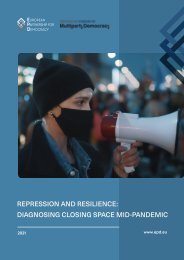Thinking Democratically: A Comprehensive Approach to Countering and Preventing Shrinking Space
Create successful ePaper yourself
Turn your PDF publications into a flip-book with our unique Google optimized e-Paper software.
Instead, people resort <strong>to</strong> less conventional methods of dissent that provide much more anonymity,<br />
such as strikes <strong>and</strong> mass demonstrations.<br />
While the protection of a restrictive status quo, <strong>and</strong> the gradual erosion of fundamental freedoms<br />
<strong>and</strong> democratic institutions are harder <strong>to</strong> detect <strong>and</strong> call out than a singular attack, they are<br />
incredibly harmful <strong>to</strong> democratic space in the long term.<br />
Even in cases of clear attacks on democratic space, it is the sum of attacks over time that makes<br />
them so detrimental. The extension of the Foreign Agents law in Russia <strong>to</strong> also include journalists in<br />
2019, after its initial adoption in 2012, serves as a powerful example here. Even though most<br />
European CSOs can operate in relative freedom as compared <strong>to</strong> some of the case studies under<br />
examination here, a survey of European CSOs showed that in early 2016, 58,7% of respondents<br />
considered conditions for their operations <strong>to</strong> be deteriorating. 74 The small restrictive actions that<br />
lead up <strong>to</strong> this do not make international news <strong>and</strong> are hard <strong>to</strong> moni<strong>to</strong>r even for local civil society,<br />
but add up <strong>to</strong> a closing space.<br />
C. Global phenomenon<br />
While the repercussions of attacks on democratic space are felt within state boundaries, the<br />
phenomenon is global in nature. Across case studies, it is clear that different ac<strong>to</strong>rs trying <strong>to</strong> restrict<br />
contestation learn from each other. The Russian NGO law labelling foreign-funded NGOs as a foreign<br />
agent has, for example, been replicated all over the world. In addition, international donors <strong>and</strong><br />
au<strong>to</strong>cratic global powers were seen <strong>to</strong> play a major role <strong>and</strong> exert substantial influence on nationallevel<br />
attacks <strong>and</strong> the mitigation thereof.<br />
A major implication of this is that global coordination will be essential for countering such attacks.<br />
As detailed above, donors have decreased support for civil society <strong>and</strong> relegated more control <strong>to</strong> the<br />
government over the usage of development cooperation, thereby cutting off a vital lifeline for those<br />
on the frontline defending democratic space. Strong coordination on financial <strong>and</strong> political support<br />
<strong>to</strong> pro-democracy ac<strong>to</strong>rs is critical for defending democratic space in partner countries, <strong>and</strong> at home.<br />
3. Many ac<strong>to</strong>rs are involved both in the closing <strong>and</strong> defending of<br />
democratic space, with a dual role for political parties<br />
A. Ruling parties as the main but not only perpetra<strong>to</strong>r of closing space<br />
In most cases, the ruling party is the main perpetra<strong>to</strong>r of shrinking democratic space, with nearly all<br />
cases exhibiting some degree of abuse of state resources <strong>and</strong> institutions by the incumbent. This is<br />
74<br />
Civicus (2016): Civil Society Reports show evidence of shrinking space in Europe. Available here.<br />
45

















